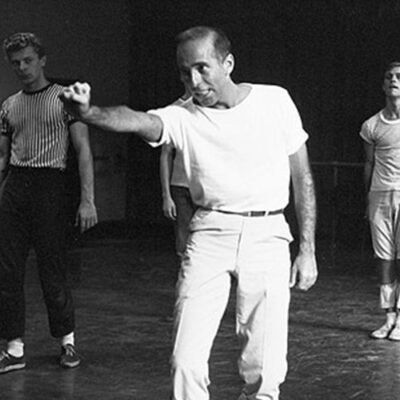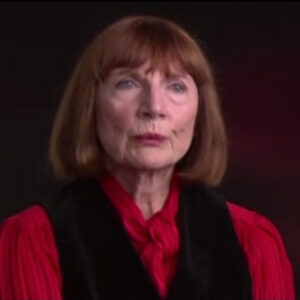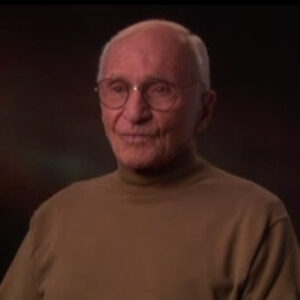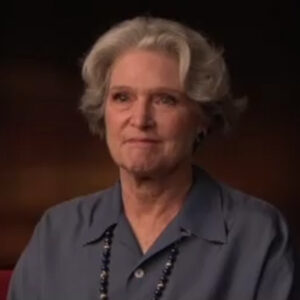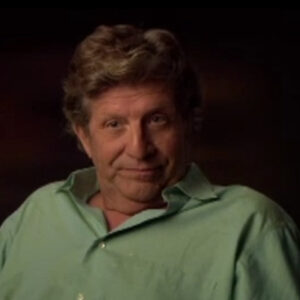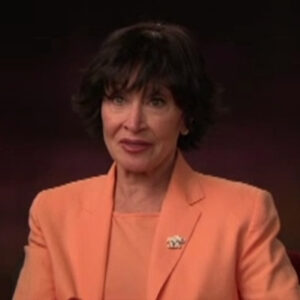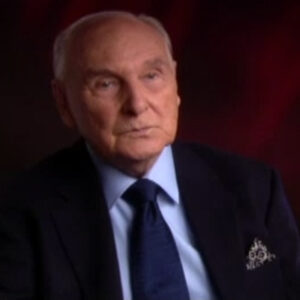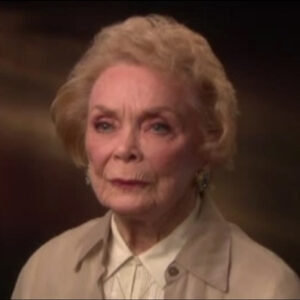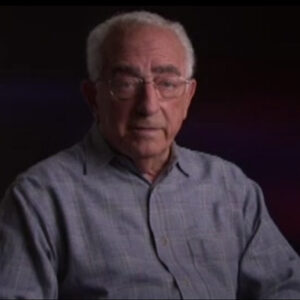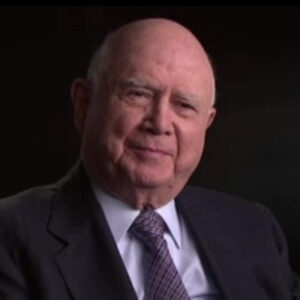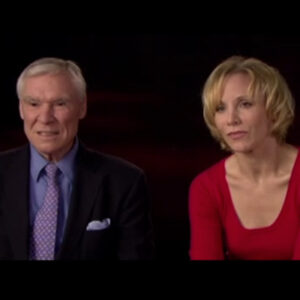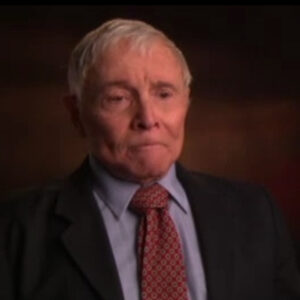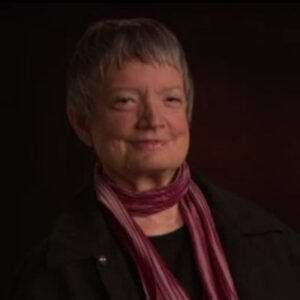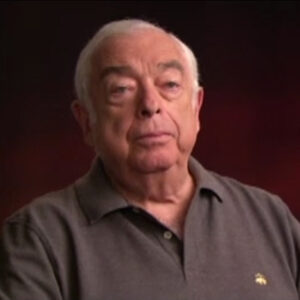Speaker I met Jerry Robbins a great deal during the middle 50s when I was over here with Julie Andrews and the height of the excitement about my fair lady and of course, he was just about to do West Side.
Speaker It was actually being shopped around. And Howard was a good friend and of course, at that time and not become a director.
Speaker And he introduced me.
Speaker He Helprin’s introduced me to Jerry a number of times. And then out of the blue, he invited us to come and watch a dress rehearsal of no dress rehearsal run through West Side Story. And I got to know all of us well. I already knew all of us. Smith, the designer of both My Fair Lady and West Side, and I got to know all of his assistant, who also became kind of a famous designer of opera, Robert Ohan, and.
Speaker So I much enjoyed being kind of kept in the loop about what was going on with West Side, because as you may be aware, I’m sure it took several years to get it off the ground.
Speaker And in the course of those several years, Oliver, along with Robert Hand, made eight different completed models of different design versions of West Side Story. So one of the things I loved hearing about was the Washington I guess it was tech or dress rehearsal. And those days you were able to go through the night, there wasn’t any interruption from equity saying we must rest or whatever.
Speaker And in the wee hours of 3:00 in the morning or something, with most of the company bundled up in the Woolies and things sitting out in the auditorium and legs hanging over the seats and so and all of it, even over two rows of seats, was suddenly called by Jerry, who was down just behind the conductor’s position, near the stage, saying all of the.
Speaker They had just done this scene, all the sets, so many hours and said, Oliver, clearly you have given this no thought at all.
Speaker And Oliver Stone, having gone through these eight different versions, said, Jerry, what are you saying? He said, well, look at that.
Speaker Do you think that looks like a little Puerto Rican girl’s bedroom?
Speaker And I said, oh, well, Jerry, what would I know about a little Puerto Rico’s bedroom?
Speaker So lots of stories like that and about our share of having to get a chair and sit in the middle of the stage and talk sternly to Jerry and Lenny Bernstein and saying, boys, boys, this could even be very wonderful if you would just behave towards each other.
Speaker Hmm. And indeed, it was.
Speaker But I first got to work with him when Hal asked if I would be interested in how he’d seen a couple of productions of mine in London, and he asked if I’d be interested in designing sets and costumes for a musical of a Terence I’m sorry, a Plautus play. And it was just. Yes, sure.
Speaker Start the first, yeah, if you could also identify how by both his names.
Speaker Yes, I well, I suddenly realized that.
Speaker I first got to work with Jerry when Hal Prince asked if I would be interested in meeting with Jerry to discuss the possibility of working on a funny thing happened on the way to the forum. I had seen a couple of productions that I had designed in London and he was curious to know if I would feel prepared to do what would be only my second Broadway production and this one musical.
Speaker And my first had been something that lasted Assam’s back play that only lasted one night. So I was very much a neophyte. Had just done two of Broadway productions.
Speaker Yeah. Peter.
Speaker Mm hmm. Are we OK now and do we know how that happened so it won’t happen again?
Speaker You’re right.
Speaker I had seen a couple of things that I designed in London and was asking if I might feel prepared to tackle a Broadway musical settings and costumes and and if so, he would like to introduce me to Jerry Robbins. This actually came about during a run through of Robbins Valley, USA, which he was having. I think it was either the city center. I’m pretty sure it was in city center prior. It wasn’t open to the public, but it was prior to his taking it to the Spoleto Festival in Italy, where he was going to launch his own company, Balnaves. And of course, it contained all these extraordinary things like the concert and moves and so many of his. Incredibly individual and personal pieces that record nobody else’s work whatsoever, and I was just aghast, I was nowhere near the geezer I am now. In fact, there was just in my early 20s. So seeing something this fresh, this original, this brilliant actually took my voice away from me so that when Hal brought Jerry up to say hello, I was unable to make a sound and he saw it.
Speaker And then a little later that same afternoon, we had our meeting and I had to write my answers down on a little pad of paper. I was so in awe of the man. And of course, as you well know, socially, he was an angel and he was extremely pleasant and encouraging and going through all the things in my portfolio.
Speaker So we did start to work together on it. And it was really, really interesting. Nothing at all like the ultimate version, which was, so to say, the George Albert version was much more in Jerry’s mind, I suppose it’s corny to say, but much more ballet oriented. And that he saw it cynically as being buildings made of silk with defined by ropes and so on. And so that was a very, very exciting time. But then his company, Ballet USA, had this monumental success and Spoleto and he was invited to make a world tour of it. And so he said he was unable to continue on for him. At least that’s the version that I know. Should you wish to know, Jerry? Larry Gelbart version, Larry, who co-wrote the script. A funny thing happened to me before. It’s in his autobiography. Laughing Matters or Laughing Matter, I suppose. And that’s a pretty brutal version, but I wasn’t conscious of that at all. And then suddenly how I invited his mentor with whom he shared an office, George Abbott, to take over.
Speaker So I lost that. The thrill of that experience of working with Jerry, at least until the show had trouble out of town, by which time Jerry was free of his obligations to his touring company. And Steve Sondheim, who had done a lot of his preliminary work with Jerry. And of course, Larry Gelbart and Burchinal begged how to bring Jerry back into the picture. That was very tricky because as everybody involved in the production was only too well aware, Jerry had named the names of some of them, including some of their wives. And so how called Zero Mostel, who was starring in it and said and Zero had actually last about 10 years of work as a result of having been named at the Army McCarthy hearings and. He asked how he how Prince asked if he would be prepared to work with Jerry Robbins and supposedly, according to how I remember, the Social Zero said, what are you saying?
Speaker You mean we should sit and eat with him? And he said, no, you know, he’s the best play doctor there is and we need him. And indeed, we did. In fact, at one point I remember listening to the radio as I was having my breakfast and the Taft Hotel in New Haven and hearing. George Abbott being interviewed and saying, I think we could save this sucker if we could throw out all the songs so you can sort of understand why Steve wanted Jerry back and how would you do it to zero and zero said how we of the left do not blacklist. And, of course, wonderful historic remark. And Jerry came in and actually came in when we transferred to Washington and we were all lined up on the stage of the National Theatre.
Speaker And he walked along the line with his back to the auditorium saying, greeting everybody and a very charming and understated way. And of course, every one of us was riddled with anxiety that we were going to be the one that would be fired or replaced and finally got to zero and zero.
Speaker Greeting him warmly said hi loose lips.
Speaker And of course, Jerry burst into laughter along with everybody else and that kind of burst bubble of anxiety. And it was fine, pretty much fine from then on.
Speaker Just going back and tell me what the audience reaction was to the show.
Speaker Well, in New Haven and particularly in New Haven, it was incredibly confused. And one of the first things is it’s famously been reported that Jerry said was you’ve got to tell them what to expect. That time the show opened with a song called Love is in the Air, a charming little sort of light soft shoe romantic song by David Burns, one of the other old vaudevillians, but not even technically the star of the show. And Jerry said when he came back, and you can’t give them that incorrect signal, you’ve got to tell them what it’s going to be. And everybody was well.
Speaker And Steve at that point was pretty brutalized from the treatment he was getting from zero to some extent, and partly from Abbott, who was, as I mentioned, kind of impatient with the music he liked, the kind of more traditional romantic pieces, which is why it started with Love is in the Air, because he loved that song but loved it. Steve had actually started originally with something which he called Invocation, which was a sort of prayer to the gods. So he went back to that and said to Jerry, what should it say?
Speaker And my memory of this, which I may have coloured, but I’m not sure that I have, is that Jerry sort of said, you’ve got to say it’s nothing with kings, nothing with crowns. It’s something with lovers and liars and clowns. And in Steve’s writing way and anyway, the whole basis, I’m sure Steve would say it actually, of the song which he had already mapped out in a slightly different way, suddenly became these things that Jerry was saying to him. And Steve, with his genius, somehow consumed all of that and made a perfect focused amalgam of these things and also made it into an inviting, upbeat come on and pay attention kind of songs. Here’s what it’s going to be. Here’s what you’re going to see.
Speaker An extraordinary thing. And it literally changed the show overnight. People in New Haven had been running in groups of 20 and 30 from the theatre and on the opening night and at the National in Washington, we had all been invited by Scotty Lanahan and Scott Fitzgerald’s daughter, who was married to a Washington bigwig of some sort. And she had invited us all to an opening night party. But in the intermission of the opening night in Washington, she cancelled the party.
Speaker I mean, people were that dismayed and appalled by the show. So when Jerry came in and made these, along with many other adjustments and particularly staged this astonishing opening number, which he had kind of to some extent scripted, it literally turned the show around like that and overnight became this thing that people could be seen throwing their raincoats in the air, screaming with laughter. You see these Batea bits of clothing come floating down like mad birds.
Speaker And it was an astonishing lesson to all of us in how to structure an unusual musical comedy. And most good musical comedies are unusual. They’re their own fresh, original thing. And here we had this bizarre I was a Steve Sondheim’s first score or first performed scores, you know, and he was not only dismayed by the heroes behaving like a baby with him, but also I remember standing with him in the corridor with Steve by the. Stagedoor in New Haven when Lenny Bernstein came back and of course, Steve couldn’t wait to hear what he had to say and he said, what are you trying to be me?
Speaker So it was just heartbreaking, that whole experience, and it was just thrilling being involved in the sort of sadness and the injuries acts revival when it was just all immediately embraced, even though Jerry’s staging of the opening number had been left aside on account of fear of lawsuits and so forth.
Speaker And because it probably is worth talking about trying to make very happy with a new costume, designs on forum and stuff like that, you know.
Speaker Okay. Um, you know, I was asking if you’re familiar with Guilford’s reaction to Jerry’s hiring more.
Speaker Yes. And they were quite distraught and they I’m so sorry. And it was not just zero that everybody was worried about John Carradine. I think it was one of the names that had been named and had Madeline Gilford, the wife of Jack Gilford, who was playing Mysterium, had been named by Jerry. And they were I mean, I think they felt vindictive because her life had been really trashed as a result of that, her career and and Jack was an adorable, sympathetic fellow. Jack Gilford was really needless to say, I’m distraught on his wife’s behalf. And in fact, later, when Kazan, Elia Kazan was one of the first people to be given the lifetime achievement award by the American Museum of the Moving Image and even later still given a special Oscar. And they were amongst the people who most bitterly opposed those awards being given and would not attend in any way, make themselves a part of it. And so there was it was very there was an undercurrent of deep, deep discomfort. And I was always kind of dazzled that Jerry was able to kind of float above that and communicate. I’m not sure that he ever communicated with Madeleine, but certainly with Jacques. And there were other folks, too, I’m not quite sure. I mean, there were quite a number of people involved in that production who came in as a result of Abbott and who would probably not have been there if Jerry had stayed with the production. So it was very tense, to put it mildly. The other thing that was remarkable was the. Was Abbott’s open hearted welcoming of Jerry, who is by now as a result of West Side and so on, not just a collaboration or an associate of Abbott’s, but a director and, you know, a big, big name. But Abbott was completely comfortable, to my knowledge, and welcoming and worked with him in a deferential way. And astounding when you consider who George Abbott was at that time.
Speaker I mean, there was no more substantial figure in the American musical and American theater probably at that time. Actually, while we’re on the subject, George Abbott was an.
Speaker How can I start this? George Abbott, who had mentored Hal Prince and had been the first director to bring Robbins on board as choreographer, I believe, and he had been, of course, a noted actor and an enormously successful playwright and director and the writer of books for many musicals and a collaborator with many of the most famous people in the theater and had been in it. Well, the the thing that I most love about the length that George Abbott had been in the theatre, it was that towards the end of his life, he was lying about his age. He was admitting to 105 and I think he was 107. And at that age, he made an appearance at the opening night of a show that he had co-written and originally directed, Damn Yankees. And he had abandoned his walker and made his way down to the front rows and in the intermission because of not having his walk. He was somewhat trapped. So he was fodder for the TV news cameras. And one of the TV interviews said to Mr Abbott, what are what has been the biggest change in the theatre since you started out? And Abbott went, oh, electricity.
Speaker I think this, of course, gives you a sense of how long he had been there and how long he had been Mr Abbott.
Speaker Nobody called him George, as you, I’m sure now. So that was an astounding experience to me from my first Broadway musical to me not only be working with him, but Jack Cole and Jerry Robbins and.
Speaker Wow. So you talked about the tension, some points that came through. Yeah. Mm hmm.
Speaker Well, I’m not that conscious of how much of it was to do with Jerry’s political history and how much of it was to do with Xeros. And this was the first time that I had worked with a big orchestra and and was being required. He was a very physical guy and he was being required to dance. And he had been knocked down and towed under a bus for a couple of blocks. And one of his legs had been completely smashed up and distorted. And although it had been fixed and repaired by a famous surgeon, it was not something you should look at as you needed to look at the limbs of a slave in Roman times. So he looked like a Undun, uncooked hamburger. And so that was one of the reasons why I had to put him in those leggings, which I did find in the research on old Roman and low comedy from the times of Terance and and Plautus. Luckily on Evars, I found these. People with sort of extraordinary unitards under their tunics that looked as if they had been loosely knit even, and those images had enormous loosely knit woolly palaces as well, but we thought we should draw the line at that, given that we were aiming at a family show and but. There were various bits and pieces that one reason I think of it is that some of those legs, those leggings had been put on false legs and we had actually. Oh, I’m sorry. This leads to Jerry, but on the opening performance in New Haven. Zero and Gerri are not coming back into the picture by then, and Zero was extraordinarily nervous about his first song, which wasn’t the opening number, as I mentioned, but was a pretty little picture, which is a tongue twister and musically sophisticated, as well as being an amazingly complex tongue twister. So when the orchestra intro started, Zaira, who was very nervous because they were the first public, you know, the nurses and the off duty cops and so on, who came to this invited dress. And they took a massive intake of breath in preparation for the tongue twister and little balls of mohair went up his arms and into his nostrils started choking wildly. So he came offstage and shook me up and down. I was standing in the wings. Sadly, I have him down by the neck and we had to exchange those wolly. Then we kept them for all of the other characters. But Xeros now had to be turned into towelling versions of the same thing and you know, terrycloth. And we had to make dozens of those so that every time he left stage he could go into a new one. And so he we had all these Mohand knitted versions that were unused. And Jerry immediately when he came in and said, do you have anything that you’ve cut from the show that I could possibly use in the opening number? Because by then the show was such a clear calamity that Howard wasn’t going to put a lot of good money after bad to try and save it. And it was as if you had given Jerry a pocket handkerchief and said, now do 25 astonishing things with this. And the opening number is just jam packed with things of that sort where he created comedy and incredible inventiveness out of some of them that had a very long beak to it that we had to cut because it threw shadows. And so Jerry attached three balls to it on springy elastic and so that, you know, the juggler juggle with them. And then they all went around and continued to bounce about on these so many of these amazing sight gags that he just developed from stuff that we had lying around. Astonishing thing. And he also I said, are there any costumes that you would like altered or replaced? And he said, well. I’m just wondering if there’s something better we can do with the proteins, who are the three dancers who served as a sort of chorus? They were eunuchs and Seija so soldiers and sailors and all of the necessary slaves. So I started doing sketches for alternate costumes of the proteins in Washington, I suppose. And then by the time we got to New York I was starting, he was he would patiently go through all of them very carefully, detail by detail and sometimes with his pencil he would ring something like an apron or a pair of sandals or whatever. And, um, and I had done dozens and dozens of them. So I started doing several to a page, as many as a dozen or 20, sometimes to a page of these alternates. And he would pin sticking the ring some little detail.
Speaker And then it was just less than a week from opening night in New York. And I said, you know, I’m going to show you all the ones you bring this. Could you make up your mind as to what you think might be the best way to go? And he went, Oh.
Speaker Well, remind me what was wrong with what we have.
Speaker So, uh, the other thing he had done was asked me to remove two little sort of masks of comedy and tragedy that I had done as little sculpted heads on the top of Senex Portico. And I had snipped them off. Oddly enough, he had asked me to remove them because he said he thought it gave a kind of tip off as the kind of evening it was going to be, whereas what he had said to Steve and all the rest of us were, you need to tell them the kind of evening it’s going to be. So, I mean, I guess he was always that complex and his reactions to things. And I took the little piece, the little tragedy piece, the cut out had that had been on the portico of the model, which he had asked me to remove from the stage set, and I pasted it it onto the sword of the running soldier in this row of figures and had from its decapitated neck had blood squirting over all the costumes across the page as my sort of opening night.
Speaker Thank you present. And of course, with his curious sense of humor, he was he certainly gave the impression that he really appreciated it. And when later I was having an exhibition of my designs in New York and I was asked by the gallery owner if there was much foreign stuff still around because I’d given most of it away. And I said, well, I did give I gave something to Jerry Robbins and he’s still in the city. So I could probably get that. And they said, Oh, please try. And so I did call them and he said, yes, I’ve got it framed. And you can borrow it as long as you acknowledge loaned by. So he did. And so I was thrilled to see that he had actually framed it rather beautifully.
Speaker And so, as I was saying before, I think if you if you are in contact with the estate, it’s probably something that you could find if you were interested in showing it.
Speaker So tell me a little bit about what form was based on that particular and a funny thing happened on the way to the forum was based on the plays of Plautus excuse me, and all the characters. And most of the plot events came from various plays by the Roman low comedy playwright Adam Titus. Machias Plautus, I think was his name. Oddly enough, at about the same time that Hal asked me if I would like to meet Jerry in connection with this musical. I had also been asked or recommended by a fabulous Italian designer to Doubleday to be the illustrator of a book cover of the collected plays of Plautus. It was a curious coincidence that within probably the same month these two things came. And so doing the research on those ancient Roman comedies was fascinating to me. They were.
Speaker They were, of course, wild, high prices, but they did incorporate music, they weren’t what we think of as musicals, but there were many musicians within the characters listed and there were musical. Breaks for enjoyment, as it were, in the thick of the very complicated plots and excuse me, but Shuvalov had written an adaptation of one of them, and it had been performed, I think, at Yale, and he had invited Larry Gelbart and then Steve Sondheim, who he already knew through, I think, Arthur Laurents to come and see it. And they discussed whether there was a possible musical to be discovered from this. And I think that when I first knew Steve, he was already trying to find a kind of musical alphabet for it. And it was fascinating. We were quite close at this time, although I hadn’t actually worked on anything of his yet and. And he was intrigued because it seemed to require exactly the opposite of what Oscar Hammerstein, Stephen Sondheim’s mentor, had stressed to Steve as being the essential musical and lyrical nub of any musical comedy, which was to take the moment at which it was not possible to speak of this thing anymore and let it erupt into music. And in this case, Steve said it wasn’t it clearly wasn’t what was wanted for. A funny thing happened on the way to the forum. What was wanted was sort of escape escapist moments of refreshment and delight away from this tortuously contorted, farcical plot. And so he was he had been intrigued by the challenge of doing something which was completely at odds with what his musical comedy education had led him to believe was the crucial core of music and lyrics and musical comedy. And that may have been one of the reasons why it had been found to be such a tricky piece to begin with, because everybody was working a little out of their conventional framework and ultimately it took Robins to bring them all back on to, as it were, the same page and to focus it so that sitting in the audience you were. However unusual this thing was to you and however unfamiliar you were with its background, that somehow you were invited in to the experience and made a part of it. And it was an astonishing lesson to all of us and an unimaginably joyful experience to be part of seeing that happen as a result of Robin’s work.
Speaker What did you do besides, um, James?
Speaker He did a lot of tweaks throughout and he completed most of Jackal’s choreography because Jack was famous for not being anxious about completing certain was the fear of death or what it was that you could never get to the end of anything. And I had somewhat the same experience with the brilliant Donald McHale on Sophisticated Ladies, these astonishing eruptions of imagination and physical and ingenuity. And that would then suddenly just falter to a stop and a new haven. There were a number of numbers that did just do that. It just stopped. And I don’t I mean, I think we didn’t even have a way to kind of tactfully glaze over that and get going. They just stop and then the next line of dialogue popped right in. It was very odd. So Jerry’s finished all those and and, of course, didn’t take credit for any of this at the time. I don’t think it was until Jerome Robbins Broadway that he thought he would like to have it known how much he had contributed.
Speaker So that was another occasion when I was lucky enough to work with him on putting that back together, bring the opening a forum back together for Jerome Robbins Broadway.
Speaker He also did completely the chase and he did absolutely.
Speaker And there was some Abati Chase already in place, part of which survived. But again, Jerry focused and added unbelievably funny moments to it and and a great deal of momentum to it as well. Which I was exhilarated by because it was one of the other ways in which it was very unfamiliar at its time. 1962 was that it was a one cent musical, virtually unheard of thing.
Speaker So the only way that I could come up with to give any variety to it was by having huge projected skies, which changed always for the songs and sometimes for other things, particularly for the chase, when there was a great deal of excitement in the clouds drama and and, you know, they would change to little puffy pink heart shaped clouds for love is in the air or whatever it was. And and I, I greatly wished because that was just something that I did as a sort of great peripheral Gracenote. I greatly wished that Jerry had been involved in the show at the time that I was doing that, because I was just doing it off the top of my head. And it wasn’t anything that was me that Abbott was interested in, really.
Speaker I mean, he acknowledged that it was sort of helpful, but he didn’t have any ideas as to how to and what to do or what it should look like or anything like that. In fact, although this is not about Jerry, I maybe should mention, because it is sort of the reverse of my earlier experience of working closely with Jerry on the preliminary designs is that when Abbott said yes, he’d like to continue with me, I said, oh, well, how shall we do this? Should I can we meet a lot and I’ll do some little rough sketches? And he said, no, I’m going to Florida. And I said, Oh, well, can I send you some little rough sketches?
Speaker And he said, No, I just told you, I’m going to Florida. I’m going on my vacation. I’m going to be dancing and playing golf. And I don’t want to have to be thinking and working. And I said, oh, well, could I have have Slimey down with a model or something like that?
Speaker He said, no, I’m not going to be working. He said, I’ll see it when everybody else does. On the first day of rehearsal, I said, Oh my goodness. He said, you know, I like a lot a lot of levels and a lot of entrances and a few levels. And, you know, you do something that you think is right. This is my first Broadway musical.
Speaker So I was desperate to call Jerry back, but I obviously couldn’t. He’d already gone to Spoleto. So actually I called Mike Nichols, who was already a chum, and he was in Nichols and May on Broadway, whatever. That was an evening with Mike Nichols and Elaine May. And although he was not yet a director, you could sort of tell he was the directorial and editing force and their unbelievable partnership. And so I asked if he could spare a moment to come and see the things that I was doing for it. And because I was sort of working randomly, I had done a lot of different kinds of sets since it was one set model, I’d done as many sets as if it was a multi musical and they were all in many different styles and one of them was an effort to impress.
Speaker That was my first Broadway musical. I’d sort of look at me, look what I can do, show the Seven Hills of Rome and everything in great detail. And one of them, I think, at Hal’s encouragement was what I assumed George ABody Vaudevillian Show to be like very sort of pasteboard and, you know, broad, bright colors and cheerful and kind of shaky looking. You know, Mike came in and he looked at them all and quite a long time and he looked at this sort of pasteboard vaudevillian thing and he said. That doesn’t remind me of anything, I bet. That’s right. Fascinating reaction and also tried to get Jack. Oh well, I tried to get Hal involved, but Hal was not yet a director, and he was very respectful, of course, of the director’s involvement. And I said, but, you know, I didn’t get anything from nothing at all. And he said, well, Jack Cole is arriving tonight and he’s going to be staying at the Algonquin.
Speaker Why don’t you give him a call? So I did, and he was just checking in when he picked up the phone there and I said I wondered, did you have any thoughts when you first read the script, any kind of visual imagery of any sort? And he said, oddly enough, I had a very clear, strong visual image immediately. Doesn’t often happen to me, but I did. And I said, oh, could I come and chat? And he said, yes, of course I’m going to take my stuff to my room. But in about an hour, I’ll be down in the bar and you could come and meet me there. So I did. And he was sitting cross-legged on a barstool in a bright orange, chilly and dirty. And I said, I’m so excited that you got this image. He said, yes, it’s very odd.
Speaker It’s a it’s an image of a. Beautiful.
Speaker Sinuous and long, tall black girl with long, wavy, pale blue pubic hair.
Speaker Oh, thank you. Stocco popped off before even ordering a drink.
Speaker But actually in still in the Jerome Robbins Broadway version, there was a costume in which this pale blue chestnut fringe wig was matched by this pale blue train at bikini bottom. That was a sort of distant relic of that first image, an act of desperation, certainly not of taste.
Speaker But yes, you know, I think you might want to correct the record. Had something. Yeah. I read in one of the Robin’s biographies, Jalbert, actually, that, um, Steve said that Jerry said to Jerry when he came and told the author, you’re being killed by the state, it’s too busy, you can’t see the actors. And so the story goes on to say that he asked you to change it and you refused. So when you walked around, he and the stage manager, uh, painted over something.
Speaker Well, it’s a it’s that it’s so extraordinary how big a story that’s become the two little tiny trees behind the central building that on the central building was the hills of Rome. It was actually the shape of the shadow that the projected skies through as they went across syntaxes house in the middle. So lower down that shadow became a built hill and it was kind of a plain looking thing. So to just make it a little bit more interesting, I took two little trees off a Roman vase of a Roman low comedy performance and put them just to slightly conceal the entrance in the back of this hill.
Speaker And because it was an entrance, people always passed these trees. And sometimes, especially with the wooden mohair, they would get caught by it. And so that would be somehow more noticeable than it need to be. It certainly wasn’t busy or nor was anything about the set busy. It was rather overly.
Speaker As plain as the nose on my face, because the costumes were going to be basically the high color. But it is fascinating how their stories develop and grow. He didn’t you know, I asked him if he’d like and that wasn’t Jerry, that was long before Jerry. And that was how and Jacko and I think maybe George, but I’m not sure how Jacko both said you’ve got to remove those because they’re catching the costumes and they’re becoming too noticeable. And I said that it’s going to be so boring there. And so they didn’t really ask me any further.
Speaker They just went and removed themselves thinking about Jerry. So how would you describe.
Speaker I can’t say more about that question. It’s. Because I’m not quite sure what you’re asking.
Speaker You told me that at one point, and I hesitate to tell you this because of essentially what I want you to tell me, but you told me he took the original impulses for the shall retrieve them and made them work in a healthy way. And that’s what I’m thinking of. Not only that, of course, he was very fast on what he knew, but there was something about his thinking he would go back to the root of something. Mm hmm. And he thought about the show as a whole. Mm hmm. Can you.
Speaker Yes, I do, but I’m not quite sure how to describe it.
Speaker Did it really well so well, that’s why I can’t do it now. It’s all used up.
Speaker I suppose one of the things that was intriguing to observe as soon as Jerry went back to work on the show, came in to save it, as it were, was that he wasn’t just somebody like the traditional show doctor who looks at what’s on stage and says we need to fix this, and that he was somebody who had been there at the birth of the idea of the show to some degree.
Speaker And he had been by the time I met him, he had already been working closely with Stephen and Batsheva Love and Larry Gelbart. And so he was able to tap in to his gut instincts about the very fresh and original, albeit archaic, nature of the material and really explore what had been his initial impulses when he was imagining directing.
Speaker And so and although I think he would have probably directed the whole thing very differently than Abbott did, as Abbott really embraced the kind of echoes of vaudevillian humor in it and. I think Jerry being probably a much more visual person than Abbott was very conscious of the kind of research that I was able to explore, too, and which was fascinating because it’s so weird. It’s not anything that you can recognize through memories of, you know, the plays of Aristophanes or Sophocles or even old circus or anything like that. It’s very specific, very particular. Low comedy stemmed from Greek comedy. But then Roman called it in comedy, made it even broader. And even the little elements of buildings, scenic elements, which were not traditionally things that would crop up in Roman tragedy, were a big part of the imagery of it and the things that I used. The only person to recognize that, by the way, despite all these very intensive and mostly delighted reviews, um, the only person to acknowledge how this peculiar Broadway set actually echoed some of the early research was Liz Smith. And that was because, um, significant other, I guess, at the time was an archaeologist and had seen the performance with her and had drawn attention to the roots of some of what I had done. At any rate, that was stuff that Jerry was reverting to to in his dealing with it. But he wasn’t doing it in a way that was, at least in my experience, that was in any way making less of what existed today by courtesy of Abbott and Jackhole. He took. The elements that were working and he didn’t try, I believe, to turn them into what might have been his version of the show, but he colored them with his. Research and his knowledge and still fitted that to what Abbott and Jacko had already done, and so you couldn’t say that it was an enormous amount of changes. It wasn’t. It was this drastic and crucial change to the opening number. And then tweet, tweet, tweet, tweet, tweet and big staging things added to the chase and the completion of Jackal’s unfinished numbers. But otherwise, you couldn’t say there’s a whole lump of Jerry there. And in what I was watching, because I was fascinated beyond imagination to see this going on. He wasn’t particularly communicative to the performers. Sometimes through other people, through and. Jackal’s choreographic associates, but I was expecting him to do, you know, a lot of sort of whispering dizzier and to my knowledge, there wasn’t a lot of that.
Speaker It was more. Like. Hmm.
Speaker Like incredibly inventive stage management, in a way. Coloured by.
Speaker His already. Obviously intense.
Speaker Effort to discover what was fresh and would still work in this archaic old material, which if you read. Baldly in translation, in a book, Applause Splays is virtually an followable, and so he’d already gone that journey, I think, when he had been imagining the production that he was going to make and in some incalculable way.
Speaker The week that I couldn’t observe happening was able to bring the spirit of that into what he did on transforming the mess we were in.
Speaker And yet somehow with this one number and a whole bunch of tweets went from 30 people walking out of the door.
Speaker Yes, well, mind you, this is the biggest lesson to everybody from that production. And it’s a story told over and over if you do.
Speaker Give the wrong signals in the first moments of a production, it’ll take forever to recover from it and maybe it will never happen. And in many of the shows that I’ve been involved with since I’ve seen the risk of that about to happen and always become an immediate and unloved blabbermouth, sometimes I can even see hatred streaming from people’s eyes, as I recall how crucial that advice was. And it’s true sometimes even in other productions that I’ve been involved in, where not quite as obvious and substantial way, but where the beginning of a show has been altered or trimmed away altogether, it can radically affect how the rest of the evening is accepted. And it’s one of the truisms of any kind of editing, as you know better than anyone, that when you look at something that isn’t working, you need to look at the thing before it. And in this case, this was the sort of maximum example of that.
Speaker You told me that everything you did was productive in terms of storytelling, similarity and consistency. Could you talk about that a little bit and maybe give me some examples?
Speaker I mean, this is not not useful, but I’m not quite sure why I said that, I’m not sure that that’s entirely true.
Speaker That was Abbott’s gift, really trying to make clarity be a big part of what was going on. Tell me the story. I want to know the story. And he was so deeply and I told you, I know this is not anything useful for this, but the story when he came to do it in London, although it had all been pre stage to some extent by Virtue Traveller, he it got to the point where.
Speaker And.
Speaker Senex, you know, that old man who had been sent by his atrocious wife to have the nose of her best prepared because it had dropped off the chariot and.
Speaker I can’t quite remember the plotting of this, and I have to get it right.
Speaker The young virgin with whom our hero hero is in love had been told that she was to wait and the dirty old man’s house because he was going to be away and that her general would come for her and he would knock on the door three times. Senex, who was off to get his wife’s bus repaired, comes back unexpectedly to the house and knocks with his foot actually on the door three times. And when he came to that moment in the rehearsal in London, George Abbott went, oh, he was so intensely involved in the story always that, you know, he that that was his motor. If it wasn’t clear what was about to go wrong and why he that was his immediate thing to fix. So I’m not quite sure why I gave Jerry the credit for that.
Speaker I think that’s something that he must have learned from that. Possibly, yes. Yeah, because I think that can I think that can be said.
Speaker Yes. Yeah. Oh, absolutely. But I don’t think that was the problem that he was trying to fix. The problem was it was this incredibly bawdy, incredibly bad taste, you know, revelling in bad taste.
Speaker Joe, um, in which even most of my costumes for the Courtesan’s were, well, certainly taste free even. And George Abbott actually made me change some of them because he thought they were too racy.
Speaker So when we came to the Iraq revival, it was lovely to be able to pop some of those back in say that collaboration is like a lot of people getting stuck on the flypaper.
Speaker Oh, my God, that’s wonderful.
Speaker ET cetera. Yes. You described Jerry as a collaborator.
Speaker Amongst the astounding range of collaborations I’ve been lucky enough to have, I would say that the collaborations that I was blessed enough to experience with Jerry were by far and away the weirdest and most complex because.
Speaker As everybody knows, socially, he was this angelic and an immensely enjoyable, gentle creature, but in the work process, his demons emerged and it was also extremely difficult for him to impart the brilliance of his inspiration.
Speaker And so I know other people that have had this experience, but in all of the experiences I had on forum and then on the parts of it that were revived for Jerome Robbins Broadway, I would have to say it was like trying to catch squirrelling Mercury in an open net that you knew something important was coming, but you couldn’t kind of catch it.
Speaker And for example, the great part, Xebra, the costume designer with whom Jerry worked a lot and I worked well actually in the course of one of those experiences, ended up giving him her pants and said, Jerry, you do it. I don’t know what you want. And that was complicated. But if you stuck with it, good God, it was worth it. And, you know, obviously, there were people who were able to somehow empathetically connect with what he was trying to convey. And I was actually desperately trying to do it that way through some kind of got response to his physical gestures. And and it’s the reaching that you could see through his eyes. And I hope and I may have. Been able to, you know, find somebody that way, but when it came to doing it again on forum, my memory of how complicated that had been cut through everything. And so and also I was involved in another production with Jerry’s ex at the time. So I just used to kind of swan in and out. And and everybody, including my beloved Oliver Smith, was in such a state of distress and agony by the time that Jerome Robbins Broadway was about to was going through text on Broadway, that Jerry was sitting entirely on his own in the middle of the auditorium with nobody anywhere near him. And he would always have to call for an assistant to take down notes have and I had the unpardonable nerve or chutzpah to just go sailing in and plant myself down right next to him with a big yellow pad and say anything you want to tell me. And I think that spooked him a bit because I almost got nothing out of him as a result of that direct and approach.
Speaker But I think maybe because I was on something else and and most of what had been done on the opening number for him was already there, um, it’s possible that he wasn’t having to think about it much. There were some things, for example, in him I’d come up with a stupid thing and and the authors would change that script because the opening of the show for Comedy Night was originally raise the curtain as written in the script and. I said, you know, in many cases there was no such thing because, you know, flies in Raymond Terrace and if you could have him say lower the curtain, we could just have it drop and fall into a trap and disappear, which is what we did in the original show. There were some steps. And at the top of the steps was this invisible trap down which the inner curtain disappeared. And for the excerpt for him in Jerome Robbins Broadway, there wasn’t the possibility of any little raised stage like that that could absorb the curtain.
Speaker And so Jerry was spent quite some time trying to figure out how to get rid of it, which he eventually did by having the proteins kind of rush out as it fell and bundle it into their arms and head off stage with it. But so there were a few things that needed to be readdressed. And I started out thinking I should try to be as available as possible for this, but.
Speaker When I saw it and although this is not a thing. I feel comfortable about saying, um, but it is about Jerry Oliver Smith who had worked with him for ever and, you know, it sort of started out together in both ballet and the musical field and begged me to take over his portions of the show when by the time the show had arrived on Broadway, you just said, I cannot take it anymore. And this followed a little scene in which I mean, Shariff, who is. Seriously, elderly and fragile and should have been wrapped in cotton wool and lauded, was shouted at by Jerry, who was standing up on stage looking at the tree, I guess, Hoochie Coochie Girls, and I can’t even remember the name of the show. Oh, no. It was a show written by a man who only wrote one musical, one musical score. Um. How well do you remember Germans Broadway? It was in all of us, Smith Front, that’s it?
Speaker Mm hmm. Million Dollar Baby is the is the the seaside fast? No, it’s not. And the other thing that’s happened, so it probably was a million dollar baby. Do you remember at school for that?
Speaker Um, of course, many of us, uh, someone like Leroy Anderson or something like that, at any rate, all of it done the class for it, which was a sort of a green exterior of a nightclub during Prohibition. And these three fringe distressed girls who are outside it and and I just walked in here and Jerry was shouting for Erin and she came up to the orchestra pit, this little tiny little thing, and he was saying, this is insane.
Speaker I mean, these are not the costumes we originally had. And she said, Jerry, remember you told me you didn’t like the costumes we originally had. And he said, but the whole point of doing this show is to show people what those productions were like. It should be exactly like she Jerry, every fitting I had with these people was in 890 Broadway, where you were rehearsing. And I invited you to every fitting and you came and you’ve been seeing them. He said, oh, rubbish. And you just literally physically ripped the costumes off the girls in front of them and threw them into the wings.
Speaker It’s just an astounding thing to see. And I’m actually having chills running through me, as I think of it. It was heartbreaking. And Oliver at that point said, I can’t continue with this and please do my please protect my sequences. And I said, I can’t. You know, you’re the giant who can stand up to him. And he said, nobody can. And he was just about to start a new ballet with him or an evening of the ballets that they had done together or something. Anyone he wanted to retire from that to. So extraordinary, and then many, many times after that, I would run into Jerry in our courtyard where he would come to visit Tanksley, the clerk who would be taking the sun often, and he was always enchanting and would always have a compliment.
Speaker I was just thinking about your whatever it was, you know, or I just saw the world right at something completely unexpected and it couldn’t be more enchanting and generous. And then there was this other side and totally mystifying. But God knows, that’s why we’re still talking about it.
Speaker I guess Bob Farse had the most extraordinary.
Speaker Sort of multiple vision about every aspect of the production that was going on, and that was one of the reasons why on Pépin, although I was initially invited to do the sets and costumes, I thought I did not. I better concentrate on one discipline because it’s the first time I’ve worked with Bob.
Speaker Jerry Robbins, who, as you know, was. It was Bob was his absolute all time idol, was that to such an extraordinarily.
Speaker Devastating degree that when I think back on how demanding in every aspect was, it suddenly pales in comparison to how my Knewton meticulous and multiplied Jerry’s attention to detail was and after all is true for all of the disciplines.
Speaker It ends up being pretty much what it’s all about, attention to detail. But we don’t all have the capacity to spread it that far and wide and keep it as fiercely focused. So how would you rate his I, I can’t imagine anybody ever had a better eye than Jerry Robbins.
Speaker I’m just recalling any of the productions he did. And how many of them?
Speaker Set.
Speaker The example of what a piece what a piece of material of that nature needed to be, and it looked like and and there’s so many instances of it in a ballet, but in the musicals, too, so few of his musicals looked like each other. It was as extreme as, say, Frank Loesser, who never wrote a song in any one of his musicals that could be moved into any one of his other shows. Whereas let’s say with Rodgers and Hammerstein, they all have the same essential signature. And you could not be surprised to discover that that came from Carousel as opposed to Oklahoma. Jerry shows each one is so specific to the nature of that particular piece of material that you have to.
Speaker Acknowledge that he was the enemy, the sort of whirlpool, and to which everybody was drawn and into which through whom everybody was filtered and focused.
Speaker And it’s that’s I mean, that’s my dream. If I could find a way to always do that. Well, I do try, but I don’t think I come close to what Jerry’s is able to do. It’s nice to have everything look only like itself and not remind you of something else. And that’s it’s not another show, but something in literature or in history or whatever that is valuable for this experience. And that’s one of the things and maybe one of the reasons why Jerry was a more. Natural theater, creative force, and maybe he was in the movies and because anybody on the creative end in the theater is responsible for creating the filter through which the moment the story starts to be told, the audience starts to receive what’s particular and special about this material.
Speaker Whereas in the movies, to some degree, everything stems from some kind of believable reality, because most of the time you’re this close, closer to the people. And if you put something jarringly abstract or whatever beside it, it’s, you know, where you are and ultimately.
Speaker That’s the joy of working in the theater, that if you are not all of you in the creative soup and not guiding the audience towards experiencing what is special and particular about this new or this revisited piece of material, and what’s the point?
Speaker Mm hmm. You know, I never asked you how Ford was received finally when it opened on Broadway, when Form finally opened on Broadway.
Speaker It was received. I would say 98 percent euphorically, which was astonishing since we had all read the reviews out of town and the only exceptions, I would say, were the confusion. With which Steve’s work was received and he was in terms of the creative forces, I think was the only one who was not nominated for a Tony Award, and it was thought at the time to be incredibly an incredibly sophisticated and complicated score. And now we’ve absorbed so many other things that have been influenced in one way or another by Steve and by his genius, that when the revival came along, it already seemed entirely approachable and even comfortable.
Speaker Weird how that works for him wasn’t the only show that Jerry doctored up.
Speaker You know, he was thinking, oh, yes, I thought he was born into an.
Speaker There came a time in the. Last stages of the production of Buchen, Hynix, the Appletree.
Speaker Which was another show which Jerry had been the original director on when it was in its conceptual stages. It was then called Come, Come Back, Go Away, I Love You. And it was three different short pieces. I think the only one stayed constant throughout was the Mark Twain, Adam and Eve when Jerry had a history with it. And I think when I first became involved with it, he was. To be the director and very soon after that, some complications resulted in him leaving and Mike Nichols taking over as as director, and then when we came close to opening on Broadway, Mike Nichols suddenly said to the producer, Stuart Ostro and to Bock and Harnick, it’s time to bring Jerry Robbins back in.
Speaker And what?
Speaker Because by then, Mike was the Mr. Broadway and had been on Time magazine as the most successful Broadway director supposedly in history. And they said, But you’re Mike Nichols. Why would you need to call in Jerry Robbins? And he said, I need to I’ve gone about as far as I can go and I don’t know what else to do. And Stewart said, well, you’ll have to call them because I don’t I don’t know how to explain it to him. So it happened and Jerry came in and he was, of course, extremely charming to all of us. And and he at the end of the first act, Mike, when we all gathered in the bar, I said, you know, what would be wonderful is if you have anything to say is if you could say it to the whole company in front of us. I mean, we’ve all been through the complicated torture of trying to make a musical out of three separate mini musicals. And it would be such a sort of rewarding and exciting thing for them to have Jerry Robbins come in and tell them what he thought. And Jerry said, of course, I couldn’t do that. Of course. Of course, no. I’ll take a few notes and I’ll give them to you and you can take what you like and ignore what you doing. And so we went back in second intermission and Mike came back again and said, please, please reconsider. Everybody’s so excited that you’re here. And she said, I can’t I can’t do that. That’s not this is your show. And I have to say, as far as I’ve seen, you’ve got an amazing amount from some very complex material and and makes it. Oh, well, thank you. But, you know, I know that you know a lot more than I do about what could be achieved with it. So we go back for the third piece, Appassionata, Stephen Sondheim’s piece originally, which Michael directed as his first directorial job, show that I was a producer on which never came to Broadway and which Mike remembered when he became involved, and they got rid of one of the three pieces. And he said, oh, that was a great piece. And they all said, well, but it’s not ours. And Mike’s well, you can make it yours. Well, you can start over and do it again. You can read it. So they did and. We went back to that and came out at the end of it and bounced up to Robbins’ in the auditorium and said, Please, please, please, please. And Jerry said, look, here are my notes. You take them and there’s not much I think you’ve got as much as anybody could hope to get out of this particular production. And I’m happy to help in any way I can, but disregard it if it’s inappropriate. And Mike now went even more beseeching and said one last time, you know what it would mean to this cast. You’ve been there in this situation. And I said, oh, all right. And he took back this yellow pad, which looked sort of unused and it was open to an empty and unwritten on page. And but when he flipped it over, you could see there were about 50 pages of notes.
Speaker So Mike called the company on stage and Jerry went through these notes one after the other. And they were all these just amazing little nuts and bolts specifics, such as there was a recurring joke in the Mark Twain, Adam and Eve piece, which actually then recurred through the other two pieces about the male character like Jim Brown. And and so that when he decorates flamboyantly with flowers their home, he says, I like Brown. And then when he discovers prior to that that she’s naked, she grabs a brown towel and he says, oh, that Brown. And Jerry said.
Speaker When she discovers she’s naked, she grabbed an orange towel, you would get a laugh and. What he said now, you know, trust me. Right, and so they tried it and of course, it worked and they were that kind of thing, so specific. And again, it was I mean, I wish I had written a journal because there was so much wisdom and so much stagecraft that you just can never replace. And I regret that over and over that I didn’t just keep notes because I have these little isolated memories, but there were so many things that were equally or more remarkable about what he would pinpoint and how he would be able to focus it or fix it. That actually was pretty much stopped, Mike, doing musicals until Spamalot, because he said this is something that you’ve got to know about and I don’t know how to help with John Roberts.
Speaker Did you find that you changed it all?
Speaker So only to the extent that because of his time as as the artist, the great artist Jerome Robbins and and and the world of ballet, and he seemed to have kind of an aura of great weight about him, even though it didn’t come out in any stentorian way. He just there was a kind of birdlike like aspect that people were fearful of or responded to.
Speaker But in terms of his. His own behavior, he didn’t seem to carry any self-importance or anything like that, I would say it was just. I guess the weight of knowledge of what he had achieved that gave made us receive him that way and to some extent allowed him to see himself that way, too, although he didn’t strangely, he didn’t use it. And. He didn’t sort of. Draw on it to create power.
Speaker The power still it’s very quiet, tortured, so many top musical theater directors yourself, how would you rate his ability to conceptualize and execute his vision?
Speaker Well, when you’re thinking of comparing Jerry, say to other directors that I’ve been lucky enough to work with as a conceptualizer. I never had the experience of working with him from start to finish on any individual piece, although he gave me some invitations later on, which I was never able to, sometimes I was not brave enough to accept and sometimes just because of timing was not able to accept. And in one instance, he’s another curious example of his mind, the surprises that he was able to deliver. He had invited me to do the show. I’ve forgotten the name of it now. I think it was going to be called Studio 51 studio.
Speaker What was the studio in 8H studio? Okay.
Speaker And it was the thing with Berrin, with Michel is that what was called for here? Well, he had invited me to be the designer of that. And I started again. He had invited me to be the designer for his television program with Baryshnikov Studio 8H or something. And I had agreed and I was very excited.
Speaker But I in the taxi in which I went to meet with him and Misha, I was involved in a rather bad collision. And there was a whole mess with the police and I was kind of shaken up. My back was a habit and I got to the meeting anyway, but I was 20 minutes late or so and he was not happy about that. And I said, I’m so sorry, but I was in this crash and I’m still feeling the effects of it a bit. And I will try desperately to focus and concentrate. But I please forgive me if I’m a little shaky. And to my astonishment, because I knew the other adorable, sympathetic social, Jerry Robbins, he was very angry. He was very upset. Obviously, it just didn’t fit in with what he planned for his day. And, um, and every time I asked him to repeat something, I was trying to take notes, he would get more and more impatient. And finally I said, I’m so sorry, Jerry, but I’m not going to do you justice on that. And I’m not doing myself justice and I have to lead. And so I that was that. And amazingly, he never held it against me later.
Speaker But at the time, it was a surprising sudden vision of the lurking demon that lived within him, but an effort to return to his conceptual capacities, as it were. I don’t think I know of anybody who would have come close to him having been lucky enough to work with folks such as Nichols and Rob and and Bob Fosi and Helprin’s and so all of whom had areas in which they were perhaps unequalled. None of them could ever cover the totality in the way that Jerry seemed able to do without in any way drawing attention that that that’s what he was doing. He was usually I mean, the other thing that was kind of offsetting that offset the potential miseries that might occur was that if he was focused on you, he was focused on you, and he couldn’t be distracted into some other aspect of the things for which he was equally or more responsible at that given moment. And that’s an amazing capacity.
Speaker I can’t tell you how many times during all that stage productions and television productions and movies that I work with 40, how many times it would come up? How indebted Bob felt to Jerry, not just for the fact that he had actually brought Jerry’s work in Kiss Me, Kate, to the attention of Bob Herbert of George Abbott and suggested, despite the fact that he was the choreographer to be working on Pajama Game, suggested that Bob be brought in and of course, gave him that astounding opportunity for steam heat and many other portions of later pajama game and damn Yankees. But more than that, in some way. Robbins’. Bob conveyed to me that Robbins was such. A complete example of what he wished he could achieve and who he could be that even extended to his kind of acting out sometimes the difficult side of Jerry, which was not a natural part of his makeup at all. In fact, I’d have to say he was one of the most enchanting people I’ve ever been lucky enough to work with. But he could be. As complex as Jerry sometimes and and it’s tough on performers. Even though I don’t think it was in his nature, because as a performer himself, he had been so conscious of how destructive cruelty from creative people had been. But in some way, I know he wanted to identify with how Robin and achieved it. And to some extent, I think even. That although that was just natural behavior for Robbins, it was already taken for granted by the Times, by the time that Robin came on the scene, because Jed Harris was the principal example of that creative behavior and in his time as famous and successful, well, in his early years, as successful as anybody in the theater had ever been, both his producer and director.
Speaker And he was my very first show on Broadway, for which I only did a painting of an actress pipper. Scott, which had to be a fake bronzy portrait, was produced and directed by Ed Harris. So this is in the middle 50s. I was able to see it first hand, that astounding behavior, which could be adoring and loving and adorable and lovable at one moment and then nightmarish and surreal at the next. So it’s I mean, for me at least, it’s not as if Jerry invented that. It was already kind of taken for granted that you could get successful if you behaved like that. Luckily, most people seem to be waking up to the fact that it is ultimately destructive. And if it’s successful, it’s by some sort of bizarre fluke.

